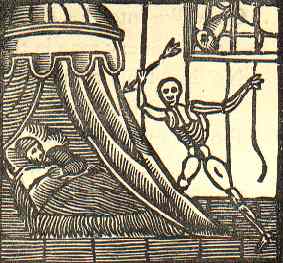Seasons awry: famine
Increasing population and inflation worsened the effects of bad harvests, causing suffering and famine among those who could not afford the even higher prices of food in times of dearth.
The problem was especially acute in towns which were swelled with migrant workers--vagrants and poor people who had left the countryside in the hope of finding employment and a better life.
During Shakespeare's lifetime the most socially disruptive harvest failures occurred in 1573, 1586, and in five successive years from 1594-98*, with the result that the price of wheat--and hence the price of bread-- tripled. (By 1555 the price of grains was over five times higher than at the turn of the century; it tripled again by the year 1600. (See also the next page .)
- Who profited* from inflation?
- An illustration* of the toll of famine.
Footnotes
-
Flooding
In A Midsummer Night's Dream Titania alludes to the floods of the 1590s which were primarily responsible for crop failures, food shortages and inflation.
-
Profiting from inflation
Husbandmen--farmers--were least harmed by bad harvests, in fact profiting from soaring food prices. But those whose livelihoods depended upon wage-earning (full or part-time) were unable to keep up with inflation--the real value of their wages fell, while competition for employment was always increasing. Cottagers and smallholders were also the worst hit by rent increases, often becoming vagrants or migrant workers
On behalf of the government the Church preached acceptance of God's will; but antagonism arose towards "covetous" food retailers, particularly when they continued to export their produce to areas where prices were more advantageous. Thus in 1597 a London baker was shipping wheat from port while people were reputed to be starving in Kent. The demands of London were a major cause of shortages in Kent.
-
Famine's effect
[Image available on CD-ROM only, for copyright reasons.]

This small detail from Bruegel's The Fight Between Carnival and Lent shows the effect of famine on one of the many in the village. Click for more on Bruegel.
